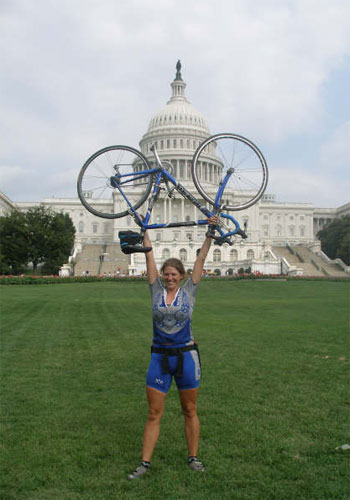Considering her successes on a mountain bike, there is no small amount of irony to the vastly different beginning Amber Broch experienced when she first climbed on a bike.
“My first ride ever was just disastrous,” says Broch, who while earning her undergraduate and master’s degrees from the University of Nevada, Reno in 2003 and 2005 also qualified for two national collegiate mountain biking championships.
More than 20 years later, the memory of Broch’s first bike ride still stings.
After experiencing a relatively successful first outing under the guidance of her father, Broch decided to up the ante and ride with her friends around her hilly southwest Reno neighborhood.
“Cars were coming in both directions, there are no sidewalks up there, so I panicked and let go of the handlebars and tumbled and flipped over into a ditch,” she says. “A lady had to pick me out of the ditch and had to drive me home.”
She smiles at the memory.
“Given those pretty humble beginnings, I’m surprised I’ve made it this far,” she adds, with a laugh.
Making a contribution
For those who know Broch, however, it isn’t really all that surprising that she was a two-time national championship qualifier for the University of Nevada Cycling Team, or that she excelled as a mechanical engineering student at Nevada.
With everything she has done — including her current role as a renewable energy researcher in the Department of Atmospheric Sciences at the Desert Research Institute (DRI) and as an instructor for the upper division Internal Combustion Engines course in the University's Department of Mechanical Engineering — there has always been an element of pure joy and discovery.
“I work in renewable energy, and I really do feel like I am making a contribution, that I am doing something that could be beneficial,” she says of her work, which has focused on hydrogen fuel cell conversion of existing transportation, and has evolved to include how to more efficiently convert biomass to biofuels. “It’s definitely very appealing to me to know that I’m doing something that’s positive for our city or for the world on a global scale.”
Enjoying the ride
Broch isn’t one to tout either her mountain biking pedaling, or, for that matter, the peddling of the value of renewable energy. She would rather let her actions on the bike or her studies in the lab speak for themselves.
When complimented on her mountain biking, which earlier this month included a victory in an event at Brian Head, Utah, Broch demurred: “I don’t know if I’d say I’m really good at mountain biking. I just enjoy it … it’s a good way to stay fit and enjoy nature.” She adds, with her usual sense of self-deprecating humor, that the memory of her first few mountain bike rides with the Nevada Cycling Team still remain: “I’d actually only done a couple of mountain bike rides my whole life. And it was mountain bike season (when she first joined the team). I went on a mountain bike ride with someone on the team, and they were like, ‘Man, she walks up the hill, and down the hill.’”
Again, from such a humble beginning, Broch was able to stretch her abilities to amazing lengths.
Following the completion of her master’s degree studies in 2005, Broch and nine others, as part of a group from the social justice and human rights group known as Global Exchange, rode their bikes from San Francisco to Washington, D.C.
The 63-day, more than 3,800-mile journey included off days that weren’t really off days at all. Broch and her compatriots spent their “rest” days helping to paint boat houses in communities, or volunteering at children’s summer camps, or even, on one particularly memorable day, hoeing corn at the ecologically progressive Land Institute in Salina, Kansas.
“I would definitely recommend it,” Broch says of the experience.
Riding in Reno
At 28, Broch is at an interesting juncture in her life. She commutes — often on her bike, of course — from DRI to the University, juggling her research with teaching as well as training.
She marvels often how well Reno lends itself so well to her passion of riding mountain bikes.
“I love Reno, and I love the outdoor aspect of living here,” she says. “I don’t even have to drive to be up on the trails of Peavine (Mountain), which is really great. I can be there on my bike, in a matter of minutes, after work. Skiing, snowboarding is only a half hour away.
“There really aren’t a lot of places that have a similar environment to Reno.”
Broch is equally impressed with the caliber of scientific work that is being done at DRI and the University, particularly in renewable energy.
Almost from the beginning of her academic career at Nevada, Broch has found herself involved in an area of study that has held great appeal to her. Her master’s degree work included a project that looked at converting a portion of Regional Transportation Commission (RTC) buses to hydrogen power. With DRI, the emphasis turned to converting more RTC buses to a blend of fuel based on natural gas and hydrogen, as well as continued study of ways to convert biomass to biofuels.
“I’m surrounded by so many brilliant people,” she says. “There is so much quality research that comes out of UNR and DRI. Some of the renewable energy research that comes out of here is just phenomenal.
“I really do feel like I’m doing something positive.”












